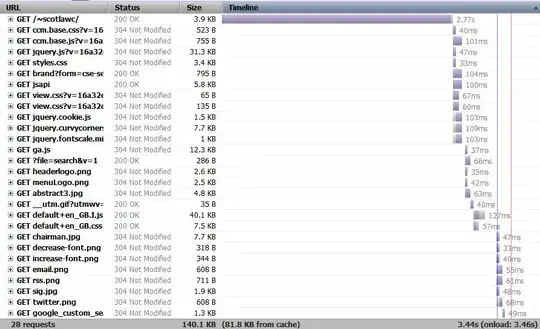I've recently moved a client's website (using the concrete5 CMS) over to a VPS running Gentoo, Apache 2.2, PHP5 and MySQL 5 and I've noticed that Apache response times are pretty bad (it was the same on the old server), sometimes way up to 8-9 seconds, but more often between 300ms and 3 seconds (towards 300ms I don't mind). I know it's not network latency, since the server has a ping (from my location) of around 30ms.
Here's an example of the times (you can see it's snappy after the initial wait):

I'm running APC (although I'm not sure that's working right...) and SuExec. Apache modules are:
core_module (static)
authn_file_module (static)
authn_default_module (static)
authz_host_module (static)
authz_groupfile_module (static)
authz_user_module (static)
authz_default_module (static)
auth_basic_module (static)
include_module (static)
filter_module (static)
deflate_module (static)
log_config_module (static)
env_module (static)
expires_module (static)
headers_module (static)
setenvif_module (static)
version_module (static)
ssl_module (static)
mpm_prefork_module (static)
http_module (static)
mime_module (static)
status_module (static)
autoindex_module (static)
asis_module (static)
info_module (static)
suexec_module (static)
cgi_module (static)
negotiation_module (static)
dir_module (static)
actions_module (static)
userdir_module (static)
alias_module (static)
rewrite_module (static)
so_module (static)
suphp_module (shared)
and PHP modules are:
bcmath
calendar
ctype
curl
db
dbase
domxml
exif
ftp
gd
gettext
iconv
imap
mbstring
mcrypt
mime_magic
mysql
openssl
overload
pcre
posix
session
standard
sysvsem
sysvshm
tokenizer
xml
xslt
zlib
I've got gzip enabled on all relevant files.
Apache is running using prefork, and the settings in httpd.conf are:
<IfModule prefork.c>
StartServers 10
MinSpareServers 10
MaxSpareServers 20
MaxClients 250
MaxRequestsPerChild 4000
</IfModule>
HostnameLookups Off
I've noticed that pages which (I think) are database-heavy, such as the CMS's Dashboard, are usually slower. I thought this might mean MySQL could be optimised. I wondered also about Apache modules - I get confused between mod_php5, mod_cgi, mod_fastcgi etc etc - there is conflicting advice all over the net as to the best one to use.
Here's the output of MySQLTuner:
-------- General Statistics --------------------------------------------------
[--] Skipped version check for MySQLTuner script
[OK] Currently running supported MySQL version 5.0.44-log
[OK] Operating on 64-bit architecture
-------- Storage Engine Statistics -------------------------------------------
[--] Status: -Archive -BDB -Federated -InnoDB -ISAM -NDBCluster
[--] Data in MyISAM tables: 35M (Tables: 161)
[!!] Total fragmented tables: 15
-------- Security Recommendations -------------------------------------------
[OK] All database users have passwords assigned
-------- Performance Metrics -------------------------------------------------
[--] Up for: 3d 21h 44m 16s (293K q [0.868 qps], 1K conn, TX: 135M, RX: 90M)
[--] Reads / Writes: 99% / 1%
[--] Total buffers: 58.0M global + 1.6M per thread (100 max threads)
[!!] Maximum possible memory usage: 219.7M (93% of installed RAM)
[OK] Slow queries: 0% (0/293K)
[OK] Highest usage of available connections: 2% (2/100)
[OK] Key buffer size / total MyISAM indexes: 16.0M/20.9M
[OK] Key buffer hit rate: 99.6% (5M cached / 21K reads)
[!!] Query cache is disabled
[OK] Sorts requiring temporary tables: 0% (0 temp sorts / 3K sorts)
[!!] Temporary tables created on disk: 47% (2K on disk / 5K total)
[!!] Thread cache is disabled
[!!] Table cache hit rate: 6% (64 open / 1K opened)
[OK] Open file limit used: 12% (128/1K)
[OK] Table locks acquired immediately: 100% (356K immediate / 356K locks)
-------- Recommendations -----------------------------------------------------
General recommendations:
Run OPTIMIZE TABLE to defragment tables for better performance
Reduce your overall MySQL memory footprint for system stability
Enable the slow query log to troubleshoot bad queries
When making adjustments, make tmp_table_size/max_heap_table_size equal
Reduce your SELECT DISTINCT queries without LIMIT clauses
Set thread_cache_size to 4 as a starting value
Increase table_cache gradually to avoid file descriptor limits
Variables to adjust:
*** MySQL's maximum memory usage is dangerously high ***
*** Add RAM before increasing MySQL buffer variables ***
query_cache_size (>= 8M)
tmp_table_size (> 32M)
max_heap_table_size (> 16M)
thread_cache_size (start at 4)
table_cache (> 64)
I noticed when a DB-heavy page was loaded, CPU usage spiked at 57% (using top) - to me that suggests there's either some badly-optimised MySQL stuff or caching is absolutely necessary to speed this setup up.
Any help would be much appreciated!